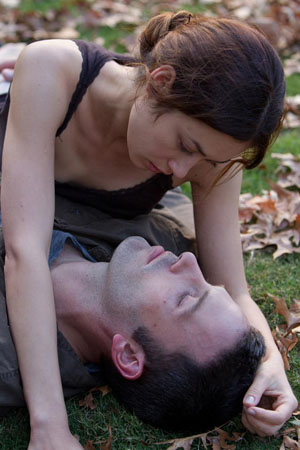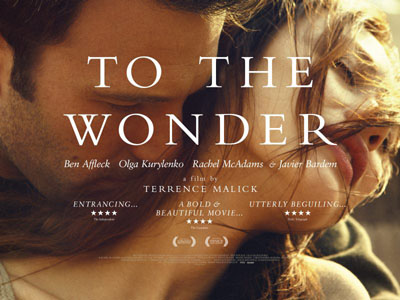“The approach of To the Wonder, [Terrence] Malick’s sixth film in 40 years and second in 16 months, has been surrounded by foreboding early reviews,” notes Nick Pinkerton, writing for Sight & Sound, and, having collected initial reactions coming out of Venice and Toronto last fall, we can verify. Viewers in the States will have to wait until April for To the Wonder, but it’s opening in the UK this weekend.
Back to Nick Pinkerton: “Where a film having two credited editors usually raises eyebrows, Wonder, like Tree of Life before it, has five, and reports have it that entire performances—Barry Pepper, Michael Sheen, Amanda Peet—disappeared on the virtual cutting-room floor, leaving Ben Affleck and Olga Kurylenko as a couple named Neil and Marina, and Javier Bardem as a self-doubting priest. Malick’s most nebulous and potentially most divisive film to date, To the Wonder has the feeling of a movie made according to Jean Cocteau’s advice: ‘What is being held against you—cultivate it, it is your essence.’ For some, myself included, this means a logical and welcome stylistic evolution; for others, that Malick has arrived at self-parody.”
For the Financial Times‘ Nigel Andrews, for example: “On the music track the Parsifal prelude’s strains play over and over, indicating the extent of Malick’s intended mystical reach. But Wagner had a story, a conflict and some half-recognizable human beings. Malick just has his amorphous religiosity and a long, unmanning struggle with his script’s unresolving harmonies.”
“Ironically,” finds the Telegraph‘s Tim Robey, “at the point when he’s settling into a more conventional work rate, Malick’s authority shows signs of dwindling. This is the director’s first fully contemporary film, and what he does with the flat modernity of rural Oklahoma, thanks to the captivating gaze of his lensman, Emmanuel Lubezki, is remarkable. You just wish his actors were permitted to occupy the movie rather than seeming in a constant state of waiting for it to start.”
“But mock as we may (and many will), there’s no doubting Malick’s sincerity and the lingering afterglow of his faded brilliance,” writes Neil Young.
On the decidedly pro side are David Jenkins at Little White Lies and Peter Bradshaw in the Guardian. Jenkins: “It’s been referred to as a ‘B-side’ to The Tree of Life‘s operatic prime cut, but that description infers that To The Wonder is some kind of funky doodle not deemed good enough as a standalone work. No, these two films operate better as a monumental double A-side, both evolved out of the same miasmic primordial yolk and constructed with an insouciant rigor that’s bound to leave the righteous slack-jawed in awe.”
And Bradshaw: “The absence of God and the presence of love are the two poles of this created world; a world perceived in a trance or delirium, and in which the problem of God gives an inexpressibly painful kind of meaning to the immediate, agonized problem of finding a complete knowledge of another human being…. There is a rich excess in this movie, and the sensual profusion is not completely absorbed into its texture. Yet only a film-maker as intelligent and idealistic as Malick could have created this kind of surplus value.”
More from Dave Calhoun (Time Out, 2/5), Anthony Quinn (Independent, 2/5), and Emma Simmonds (Arts Desk). At the Film Stage, you can watch a three-part featurette detailing the production.
Update, 3/1: A new clip from France, via the Playlist:
For news and tips throughout the day every day, follow @KeyframeDaily on Twitter and/or the RSS feed. Get Keyframe Daily in your inbox by signing in at fandor.com/daily.





